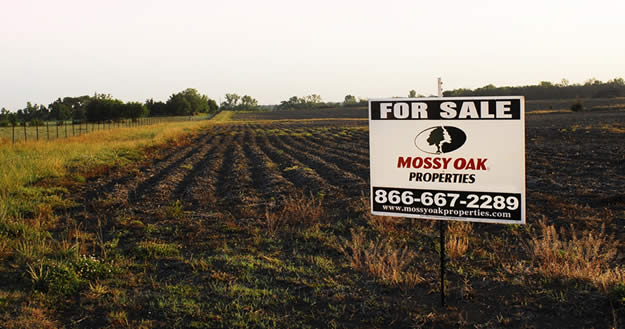
So you've found a property you're interested in, but what happens next?
Once you make a first offer on your priority real estate, then the real journey begins. In the days and weeks ahead, you'll likely encounter a series of back and forth between yourself and the property owner, making it critical that you have a certified land specialist from Mossy Oak Properties at your side to guide you through the process.
Most people aren't skilled in the art of negotiation or recognizing how much bargaining power they actually hold at any given moment. So when it comes to making a real estate transaction - typically the largest asset people hold - the bargaining and final closing process is critical.
Robert Eason, co-owner and principal broker of MOP Delta Land Management in North Little Rock, Arkansas, stated when you find the perfect property, you should consult with your agent first because you never want to make a lowball offer or pay full price.
"Your agent should have a good knowledge of comparable sales and should be able to provide you with enough information to make an offer that is in line with the current market," said Eason.
Additionally, Eason noted there are many incentives you can provide the owner to make the first offer more attractive, including:
- A reasonable price
- Being able to close quickly
- Providing or paying for surveys
Handling the counter-offer
Though you may be in the front running of candidates for a tract of land, owners still want to ensure they are getting adequate return on their investments. Though some owners may be looking to recoup lost money or settle their financial positions, most are wanting to at least earn a profit when they agree to sell.
As a result, you can always expect a counter-offer. While there is a certain level of gamesmanship involved in this process, you should still be ready to take action - whether it be walking away from the deal or to come to an agreement.
Jamie Spencer, owner and broker at MOP Tennessee Land and Farm in Nashville, Tennessee, summed up this moment in the buying process by saying, "If the owner makes a counter-offer, then the art of making a deal has begun and you're on your way to becoming a landowner."
Likewise, Eason stated a counter-offer is a sign that the owner takes your bid seriously - there's no reason to worry or become discouraged because your initial price point has been exceeded.
"Most willing and able sellers expect to receive another offer from you if you do not accept the counter," said Eason. "A counter-offer is much better than just being rejected. Make sure you have a competent agent that is willing and able to help with the negotiation process - someone who doesn't get personal when making deals."
The counter-offer is critical to keeping the process moving along so it's important that negotiations be carried out with little delay. Nick Marinelli, partner at MOP Land & Luxury in Mooresville, North Carolina, remarked you have three options upon receiving a counter-offer.
- Accept
- Decline and walk away
- Decline and counter
"Sometimes buyers and sellers counter a number of times before they are able to reach an agreement," said Marinelli.
Signing on the dotted line
To entice the owner to close the deal, you should have your financing all set. This means closing costs and other expenses should already be incorporated into the final offer. Having to backtrack and renegotiate these various fees at the last minute can put a stall in closing talks and potentially kill the deal before you can sign.
"All the negotiating should be completed before the the offer is executed," said Eason. "Who pays closing costs, and when the closing will take place are all terms that should be addressed in your written offer."
"I have found there are three things that slow transactions down," said Marinelli. "Financing, closing companies and brokers."
Because outside parties like banks and agents can sometimes bring transactions to a standstill, selecting the right advisors is key.
"Hire a good closing company," Marinelli suggested. "I have found that some attorneys are better-suited for closing land than others. Finally, have a good broker on your side to speed things up. Experienced brokers will successfully navigate you through the closing process and typically help you overcome any hurdles."
With everything laid out on the table, the next step is to wait for acceptance.
Say the owners accepts your offer after the second or third try, now it's time to seal the deal. If you're paying cash, then the process is expedited, but if going the traditional loan route, all the specifics of the loan should be finalized at this point. As soon as you get the green light on an agreement, have your money readily available to ensure the property is taken off the market.
Additionally, a certified land specialist can make sure nothing goes awry during these last stages, and that all surprises are avoided.
"There really shouldn't be any surprises once the deed has been transferred to your name," said Spencer. "The last thing I want my clients to endure after a closing is a surprise they were not expecting. If this happens, it can turn a positive real estate transaction into a negative one."
Transitioning to the closing process
Eason noted there are a few things that need to be wrapped up before the process is completed, including crop rent prorations (for ag land), official ownership transfer via the local Farm Service Agency and addressing any leases pertaining to farming or hunting on your new land.
Further, attorneys, lending institutions and probate judges will have to get involved at this point before the deal is fully closed.
While you've made it through the entirety of the buying process, you must still account for the legalities of the transaction, which takes time. Everything must be properly documented and authorized by a number of parties, which a broker can assist with.
After the property is under contract, the due diligence period begins. To better understand this final step in the process, stay tuned for the next chapter in this multipart series.
As always, contact Mossy Oak Properties for more information on the land sales industry.



























